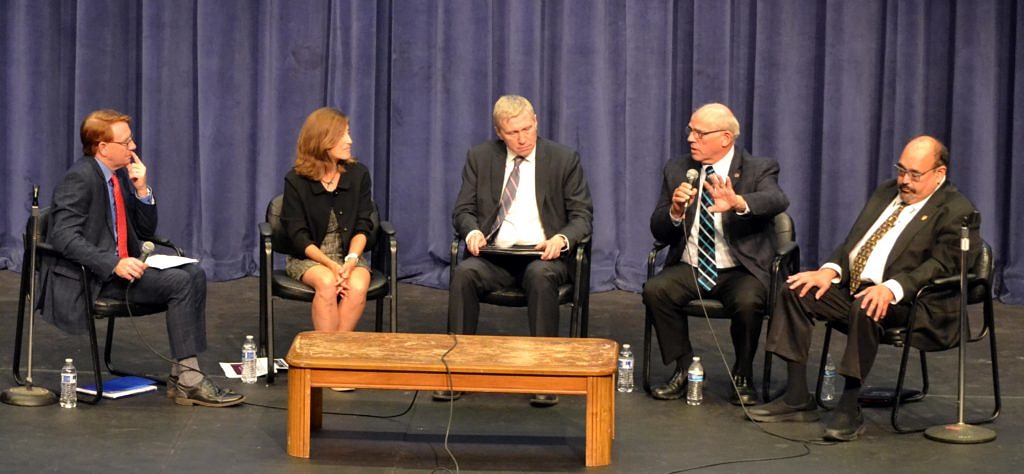
ANCHORAGE – Alaska corrections officials, elected leaders, and tribal representatives joined local and national criminal justice experts at a forum on Sept. 11 to explore the state’s criminal justice reform efforts, which began in 2015 in response to rising prison populations and high recidivism rates.
At that time, the Alaska State Legislature created the Alaska Criminal Justice Commission, a diverse group of state leaders tasked with conducting a data-driven analysis of the state’s criminal justice system. After a seven-month process, the Commission issued 21 recommendations to reduce recidivism and corrections spending, which were ultimately the basis of legislation that passed with overwhelming bipartisan support in 2016.
The Alaska State Forum on Public Safety, hosted by state Rep. Matt Claman and the University of Alaska Anchorage Justice Center with technical assistance from the Crime and Justice Institute, focused on the importance of examining and re-examining data and policy outcomes to improve public safety. The forum educated stakeholders on current criminal justice reform initiatives and described both successes and ongoing challenges the state is facing. Panelists examined the role of crime trends, prevention efforts, and the intersection between behavioral health and the criminal justice system.
In addition to the sizeable audience in the Wendy Williams Auditorium on the UAA campus, the forum was livestreamed on Claman’s Facebook page at https://www.facebook.com/RepMattClaman.
“Public safety continues to be a priority for me, and this forum is a positive way to discuss criminal justice improvements, current challenges, and potential next steps for reducing recidivism while improving public safety and the state’s criminal justice system,” Claman said.
Funded by the Department of Justice’s Bureau of Justice Assistance, this forum is the second in a series exploring criminal justice reform in which CJI assisted organizing, presenting analyses and outcomes of similar efforts, and moderating panel discussions. These forums focus on each state’s criminal justice systems, the challenges they face, and future opportunities.
“Leaders in Alaska have continued to embrace data-driven, evidence-based criminal justice policies and practices in the face of challenges like the opioid epidemic and law enforcement staff shortages,” said Len Engel, CJI’s Director of Policy and Campaigns. “This forum brought together a cross-section of stakeholders committed to improving outcomes for an invaluable conversation on the path forward.”
Rep. Claman and Jeff Jessee, dean of UAA’s College of Health, kicked off the day with a welcome and introduction.
Engel provided a national perspective on criminal justice reform, highlighting the challenges other states have faced in implementing reforms and the ways that those states overcame challenges.
Susanne DiPietro, executive director of the Alaska Judicial Council, spoke next, focusing specifically on Alaska’s reforms and the reasons those reforms were necessary, including rapid growth of corrections spending, high recidivism rates, and an unbalanced and ineffective pretrial system. A panel including DiPietro, Alaska state Sen. John Coghill, CIRI Vice President for Government Relations Greg Razo, and Department of Corrections Commissioner Dean Williams further explored how reforms have impacted Alaska’s communities and correctional populations and described promising programs and practices as well as goals for effective implementation of additional reforms moving forward.
Dr. Brad Myrstol, associate professor and director at the UAA Justice Center, discussed crime trends in Alaska and called for the continued and expanded collection of data. Myrstol joined Anchorage Police Capt. Sean Case, Council on Domestic Violence and Sexual Assault Executive Director L. Diane Casto, and Deputy Attorney General Rob Henderson on a panel focusing on crime trends in Alaska using data to identify successes and challenges. Panelists described crime prevention efforts that have shown promise and outlined future steps to improve outcomes throughout the state.
The final part of the forum focused on substance abuse and behavioral health needs in the criminal justice system. Gary Tennis, president and CEO of the National Alliance for Model State Drug Laws, presented on promising national practices and responses to the opioid epidemic, highlighting the tremendous cost of doing nothing, both in terms of financial costs – in criminal justice, health care, workplace, and child protective services – and human lives.
Following his presentation, Tennis joined a panel with Division of Behavioral Health at the Department of Health and Social Services Director Randall Burns, Alaska Public Defender Agency Director Quinlan Steiner, and Cook Inlet Tribal Council Reentry Manager Venus Woods looking at the intersection of behavioral health and the criminal justice system and effective responses to behavioral health challenges, with a special focus on the opioid epidemic. Drawing on their professional and personal experiences, panelists explored promising policies and practices to better serve those with behavioral health needs and reduce recidivism among this population.